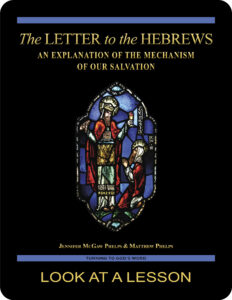discipline
 The twelfth chapter in the Letter to the Hebrews (NABRE) reminds us that God disciplines or chastises his followers. It’s easy to read into this translation a connotation of punishment, though the Greek text presents an entirely different picture of discipline and suggests a warmer characterization of God’s corrective actions.
The twelfth chapter in the Letter to the Hebrews (NABRE) reminds us that God disciplines or chastises his followers. It’s easy to read into this translation a connotation of punishment, though the Greek text presents an entirely different picture of discipline and suggests a warmer characterization of God’s corrective actions.
The Greek word παιδεία (paideia) comes from a word that means “child” and refers to the raising or rearing of children. This context brings with it the warmth of a parent along with the strong desire for the child’s own best interest. God raises or rears us and disciplines us as a part of that relationship. Most importantly, he does so because he sees us as his children.
As a child, how did you respond to your parents’ discipline? How does this view color how you view God’s care toward you and your response to it?
you also may like our study of the Letter to the Hebrews (digital only)
 Many Christians struggle to understand one of the central mysteries of our faith: how Jesus can be both human and divine at the same time. The Letter to the Hebrews: An Explanation of the Mechanism of Our Salvation, an 18-lesson Catholic Bible study with an imprimatur, offers an in-depth look at the way in which Jesus’ dual nature allows for the salvation of humanity. The Letter to the Hebrews is designed to provide information that will encourage Christians to remain faithful. Click on the book’s cover to view a sample lesson.
Many Christians struggle to understand one of the central mysteries of our faith: how Jesus can be both human and divine at the same time. The Letter to the Hebrews: An Explanation of the Mechanism of Our Salvation, an 18-lesson Catholic Bible study with an imprimatur, offers an in-depth look at the way in which Jesus’ dual nature allows for the salvation of humanity. The Letter to the Hebrews is designed to provide information that will encourage Christians to remain faithful. Click on the book’s cover to view a sample lesson.
 Click on the picture of the statue of Moses with horns (above) to learn more about Lost in Translation. A new entry is archived each Monday. Contact us to receive Lost in Translation by email every week. You may use any of the contact links on our website to ask Matthew a question.
Click on the picture of the statue of Moses with horns (above) to learn more about Lost in Translation. A new entry is archived each Monday. Contact us to receive Lost in Translation by email every week. You may use any of the contact links on our website to ask Matthew a question.
